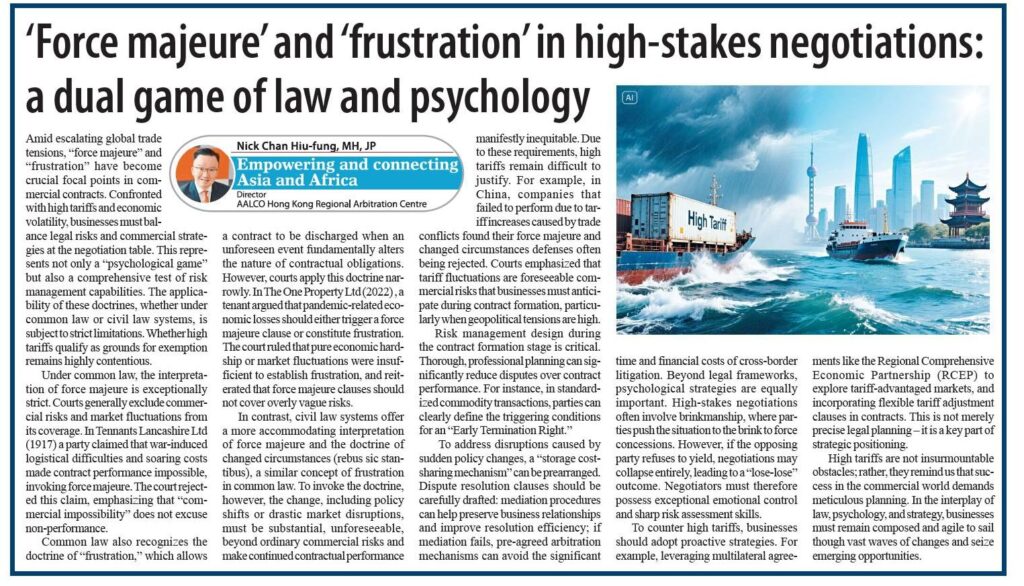- admin
- May 12, 2025
Amid escalating global trade tensions, “force majeure” and “frustration” have become crucial focal points in commercial contracts. Confronted with high tariffs and economic volatility, businesses must balance legal risks and commercial strategies at the negotiation table. This represents not only a psychological game but also a comprehensive test of risk management capabilities. The applicability of these doctrines, whether under common law or civil law systems, is subject to strict limitations. Whether high tariffs qualify as grounds for exemption remains highly contentious.
Under common law, the interpretation of force majeure is exceptionally strict. Courts generally exclude commercial risks and market fluctuations from its coverage. In Tennants Lancashire Ltd (1917) a party claimed that war-induced logistical difficulties and soaring costs made contract performance impossible, invoking force majeure. The court rejected this claim, emphasizing that “commercial impossibility” does not excuse non-performance.
Common law also recognizes the doctrine of “frustration,” which allows a contract to be discharged when an unforeseen event fundamentally alters the nature of contractual obligations. However, courts apply this doctrine narrowly. In The One Property Ltd (2022) , a tenant argued that pandemic-related economic losses should either trigger a force majeure clause or constitute frustration. The court ruled that pure economic hardship or market fluctuations were insufficient to establish frustration, and reiterated that force majeure clauses should not cover overly vague risks.
In contrast, civil law systems offer a more accommodating interpretation of force majeure and the doctrine of changed circumstances (rebus sic stantibus), a similar concept of frustration in common law. To invoke the doctrine, however, the change, including policy shifts or drastic market disruptions, must be substantial, unforeseeable, beyond ordinary commercial risks and make continued contractual performance manifestly inequitable. Due to these requirements, high tariffs remain difficult to justify. For example, in China, companies that failed to perform due to tariff increases caused by trade conflicts found their force majeure and changed circumstances defenses often being rejected. Courts emphasized that tariff fluctuations are foreseeable commercial risks that businesses must anticipate during contract formation, particularly when geopolitical tensions are high.
Risk management design during the contract formation stage is critical. Thorough, professional planning can significantly reduce disputes over contract performance. For instance, in standardized commodity transactions, parties can clearly define the triggering conditions for an “Early Termination Right.” To address disruptions caused by sudden policy changes, a “storage cost-sharing mechanism” can be prearranged. Dispute resolution clauses should be carefully drafted: pre-mediation procedures can help preserve business relationships and improve resolution efficiency; if mediation fails, pre-agreed arbitration mechanisms can avoid the significant time and financial costs of cross-border litigation.
Beyond legal frameworks, psychological strategies are equally important. High-stakes negotiations often involve brinkmanship, where parties push the situation to the brink to force concessions. However, if the opposing party refuses to yield, negotiations may collapse entirely, leading to a “lose-lose” outcome. Negotiators must therefore possess exceptional emotional control and sharp risk assessment skills.
To counter high tariffs, businesses should adopt proactive strategies. For example, leveraging multilateral agreements like the Regional Comprehensive Economic Partnership (RCEP) to explore tariff-advantaged markets, and incorporating flexible tariff adjustment clauses in contracts. This is not merely precise legal planning—it is a key part of strategic positioning.
High tariffs are not insurmountable obstacles; rather, they remind us that success in the commercial world demands meticulous planning. In the interplay of law, psychology, and strategy, businesses must remain composed and agile to secure their footing in the vast waves of globalization and seize emerging opportunities.


